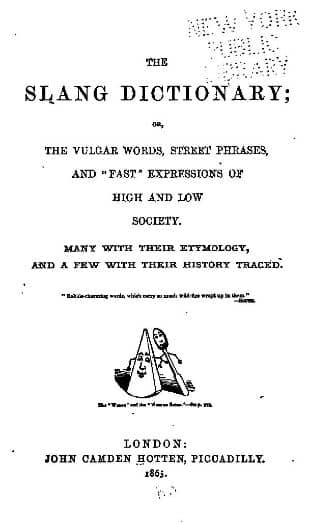‘English Slang Dictionary’ PDF Quick download link is given at the bottom of this article. You can see the PDF demo, size of the PDF, page numbers, and direct download Free PDF of ‘Black Slang Dictionary’ using the download button.
Black Slang Dictionary PDF Free Download

THE HISTORY OF CANT
OR The Secret Language Of Vagabonds
Cant and Slang are universal and worldwide. By their means is often said in a sentence what would otherwise take an hour to express.
Nearly every nation on the face of the globe, polite and barbarous, has its divisions and subdivisions of various ranks of society.
These are necessary of many kinds, stationary and wandering, civilized and uncivilized, respectable and disreputable,—those who have fixed abodes and avail themselves of the refinements of civilization, and those who go from place to place picking up a precarious livelihood by petty sales, begging, or theft.
This peculiarity is to be observed amongst the heathen tribes of the southern hemisphere, as well as in the oldest and most refined countries of Europe.
In South Africa, the naked and miserable Hottentots are pestered by the still more abject Sonquas; and it may be some satisfaction for us to know that our old enemies at the Cape, the Kaffirs, are troubled with a tribe of rascals called Fingoes,—the former term, we are informed by travelers, signifying beggars, and the latter wanderers and outcasts.
In South America, and among the islands of the Pacific, matters are pretty much the same.
Sleek rascals, without much inclination towards honesty, fatten, or rather fasten, like the insects in the famous epigram, upon other rascals, who would be equally sleek and fat but for their vagabond dependents.
Luckily for respectable persons, however, vagabonds, both at home and abroad, generally show certain outward peculiarities which distinguish them from the great mass of law-abiding people on whom they subsist.
Observation shows that the wandering races are remarkable for abnormal development of the bones of the face, as the jaws, cheek-bones, &c.,
for high-crowned, stubborn-shaped heads, quick, restless eyes, and hands nervously itching to be doing; for their love of gambling; for the sensuality of all kinds; and for their use of a Cant language with which to conceal their designs and plunderings.
The short histoiy of Cant and Slang, which precedes the Dictionary, was first published in 1859, and has not since been re-written, although the Dictionary, which follows, has been more than trebled in size, and consequently contains many more illustrations of the different classes of colloquial speech than are given in the introduction.
For the general style and aim of this preliminary performance, the compiler feels it necessary to offer some apology.
The more vulgar and less known Cant or secret terms of the London thieves are given in the Dictionary at the foot of each page.
The compiler scarcely knew what to do with some of the more repulsive of these words — ^those explanatory of thieving, &c., and which continually occur in the language of low life.
Their very existence is a lamentable fact; and the dry, impoetic way they explain criminal intentions and actions is miserable in the extreme.
Crime is an awkward thing to deal with, and, as in the case of our own Legislature, when trying successfully to regulate the punishment, and at the same time provide for the reformation of criminal offenders, he foimd the matter a singularly difficult one to manage.
Slang is generally pithy and amusing, whereas Cant, like our lower orders in their thoughts and actions, is imrelieved by any feeling approaching to the poetic or the refined.
The reader will please bear in mind that this is a Dictionary of modem Slang, — ^a list of colloquial words and phrases in present use, — ^whether of ancient or modem formation.
Whenever Ancient or Ancient English is appended to a Slang or Cant word, it is meant to signify that the expression was in respectable use in or previous to the reign of Queen Elizabeth.
Ancient Oomt indicates that the term was used as a Cant word ia or previous to the same reign.
Old or Old English, affixed to a vulgar word, signifies that it was in general use as a proper expression in or previous to the reign of Charles II.
Old Cant indicates that the term was in use as a Cant word during or before the same reign.
Obsolete Slang terms are not given ; no notice, therefore^ has been taken of the numerous expressions that occur in the playbooks and other popular literature of the past three hundred years, which have served their day, and now form no part of our tongue.
Only the living language of the time has been dealt with.
| Author | John Camden Hotten |
| Language | English |
| No. of Pages | 353 |
| PDF Size | 10.3 MB |
| Category | Education |
Slang Dictionary PDF Free Download
